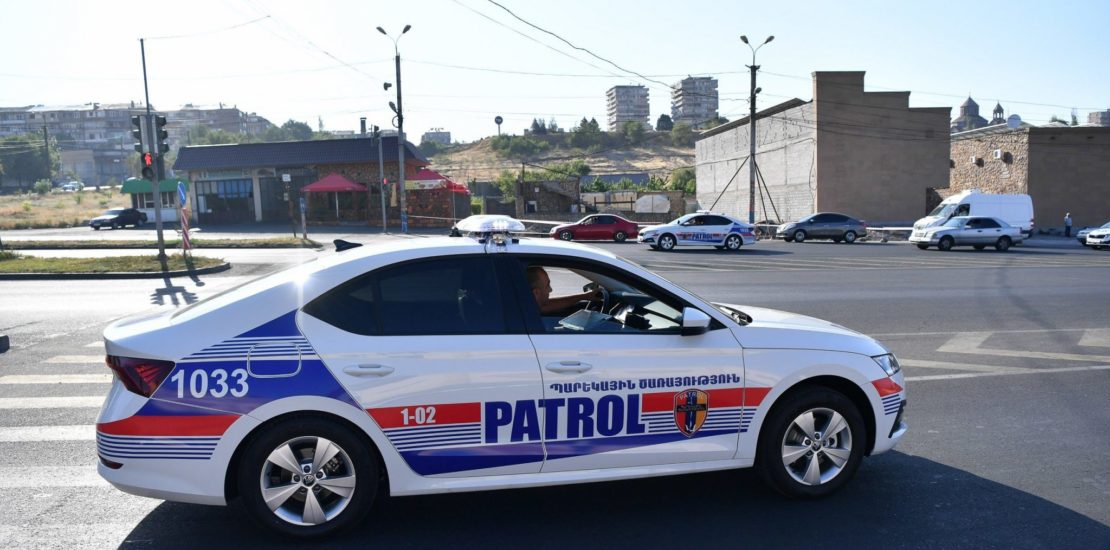- 29 February, 2024
- Useful resources, Reforms

In the course of monitoring the police reform, we continuously witness the complete indifference and forgiveness on the part of the Ministry of Internal Affairs of the violations committed by police officers.
In order to verify this assumption, we sent an inquiry to the Ministry of Internal Affairs, requesting that they report how many violations of vehicles owned by the Police were recorded by speedometers and cameras of the Police Video Recording Electronic Systems Management Center SNCO under the RA Ministry of Internal Affairs in 2023.
According to the response to the inquiry, a total of 305 violations of police vehicles were recorded during the specified period (this does not include vehicles equipped with flashing lights, for example, patrol vehicles).
To the additional inquiry as to how many of these 305 cases the police officers were subject to disciplinary liability (investigations held), they only responded that the given violations were committed based on “necessity dictated by the service” and there was no need to conduct an investigation.
Since according to the Ministry of Internal Affairs, all these violations were dictated by necessity, the Police should have taken an explanation from the officers who drove the vehicles.
We sent another inquiry with the relevant question, and it turned out that since no official investigation had been conducted, no explanation had been taken from the police officers.
However, if neither an official investigation was carried out, nor an explanation was demanded for the mentioned violations, how did it become clear that these violations were dictated by necessity?
After sending a relevant inquiry, we received yet another evasive answer from the Police that the “issues were studied, verification activities” were carried out regarding the violations. However, we never learned how, on what grounds and by whom these violations were qualified as “necessity dictated by the service” and what measures were taken to find this out.
Here it is also worth noting that the RA Law on Ensuring Road Traffic Safety does not provide an excuse called “necessity dictated by the service” for the violation of traffic rules. In other words, nowhere is it defined that traffic rules can be violated on the basis of necessity, unless it is done in a vehicle with appropriate flashing lights.
The naughty but remorseful police officers
Leaving aside the 305 cases cited by the police, let us now look at the process of reports submitted by the Union of Informed Citizens NGO.
Last year the Union of Informed Citizens implemented the “Equal Citizen” public campaign through the “Naughty Officials” Facebook group, where citizens publish the violations they record, including the violations by the Police. In connection with 13 of those violations (which concerned the Police), the organization turned to the Ministry of Internal Affairs, requesting that they hold the law enforcement officers accountable.
It should be noted that the Police duly initiated official investigations in all the mentioned cases. However, they were gracious enough to forgive the officers driving the vehicles. Part 1 of Article 16(1) of the Police Disciplinary Code was the basis for the pardon, according to which the officer shall be allowed to be exempted from disciplinary liability if the latter “committed such an act for the first time, or the police officer who committed a disciplinary violation sincerely regretted it, apologized to the staff or the victim or voluntarily compensated for the damage caused by the offense.”
You can see some of those violations below.
This is one of the first violations published in the group, where one can see two police vehicles standing in the left lane of Tigran Petrosyan street with the police officers sitting inside and having a hearty conversation, obstructing the traffic.
In response to our report to the Ministry of Internal Affairs, we were assured that the said violation was not in fact a violation, as the vehicles’ flashing lights were on.
In other words, for the Ministry of Internal Affairs, if the beacons of the given police car were on, then the police acted within the permissible limits, regardless of the reason… And it doesn’t matter at all that the given cars were standing on the side of the road, doing nothing in particular. Moreover, we learn from the answer that the police officer did only one thing wrong: he did not wear the video recording device, for which he “honestly regretted”.
In another instance, at the intersection of Halabyan-Margaryan streets in Yerevan, an official car of the Ministry of Internal Affairs was observed committing a violation under the cameras.
The response of the Ministry of Internal Affairs was almost the same as in the previous case: the officer did indeed violate the traffic rule, but since he has sincerely repented, it was decided not to impose a disciplinary penalty on him.
The Ministry of Internal Affairs could not answer the question why the violation was not caught on the cameras at that intersection, arguing that the maximum storage period for video recordings is 72 hours and it was no longer possible to verify the assumption. In any case, the intersection camera did not record the obvious violation of the car with police license plates, for which many other drivers are fined every day.
It follows from the given examples that it is not at all surprising to see 0% liability as a result of the 305 violations recorded during the year. The system “fights” against violations of the law by police officers by simply not recording them and making excuses on behalf of the officers.
In other words, police officers are excused for traffic violations for which other citizens are indiscriminately fined.
P.S. It should be reminded that we are not referring to vehicles with flashing lights.
Lilit Ghazaryan
Union of Informed Citizens


 Հայ
Հայ Рус
Рус



